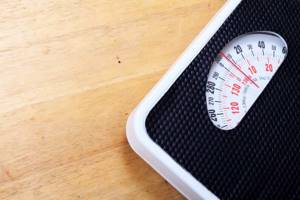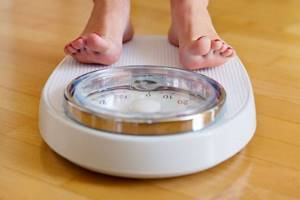Daily weight fluctuations: what is normal
In a recent interview about weight loss, an endocrinologist said that a daily weight change of 4 kg is typical for most people, but this figure can fluctuate up to 9 kg depending on body size. What is the reason for this gap and hesitation?
Factors influencing weight gain or loss
Sodium
High salt content in the diet can lead to fluid retention in the body. Its excess adds extra pounds. Some people are very sensitive to sodium, so their body retains more water, while others do the opposite.
Many people don't overuse salt shakers during meals, but sodium can hide in the most unexpected places. Cold cuts, frozen meals, and savory sauces typically have high levels of it. Canned soup is another common cause. Many varieties of low-calorie soup are high in sodium, and even homemade soups can be high in salt. A person trying to reduce food portions notices an increase in readings on the scale when replacing food consumed with low-calorie soup, but this is nothing more than fluid retention in the body.
Carbohydrates
For those who eat bread, pasta, rice, and other starchy carbohydrates, weight gain may be related to the amount of carbohydrates consumed. For every gram of carbohydrates, the body stores three grams of water to maintain an energy source. For this reason, when eating foods very high in carbohydrates, body weight increases due to the amount of water, and not due to increased fat content. Additionally, many refined carbohydrate foods are high in sodium. For example, spaghetti and meatballs with cheese can cause water retention due to carbohydrates and high salt content.
Product weight
Eating undoubtedly entails a slight increase in body weight as the body undergoes a metabolic process. Food consumed can weigh several grams at a time and reach several kilograms per day. Water contained in foods can also lead to weight gain. In addition, according to some experts, drinking two glasses of water in the form of drinks or liquid in foods adds 500 grams.
So what happens to all this weight? It doesn't automatically go into the hips. Calories in food are either used as energy to keep the body functioning or stored for later use. Waste is processed and excreted from the body in the form of urine and feces (defecation).

Excreta
Changes in indicators when weighing occur due to bowel movements. Researchers have found that the human body produces between 125 and 170 grams of feces per day. According to other sources, its average daily weight is approximately 106 grams per day. However, there are sources according to which up to 30 grams of feces are excreted from the body per day for every 12 kilograms of body weight. Bowel movements may change, but significant fluctuations in weight do not come from bowel movements alone. In fact, even after weight loss as a result of excretion of waste products, easily digestible substances that are in the process of processing still remain in the body. The normal physiological fecal transit time is 40 to 60 hours, and the optimal is 24 to 48 hours. This gap may increase if you consume large amounts of dietary fiber.
Exercises
Exercise promotes sweating, which leads to the removal of fluid from the body. Experts estimate that the average person loses about 700-1000 grams per hour of training, especially during intense cardiovascular activity. However, this figure may vary significantly depending on weather conditions and other factors. Loss of fluid from sweat does not lead to changes in weighing parameters. Why? The fluid that a person loses during exercise is restored again.
But other types of exercise can also influence daily changes. Lifting weights or any other form of strength exercise causes water retention in the muscles. Why is this happening? This type of training leads to the formation of small tears in them. Muscles store and expend water to replace losses. As these tears form and repair, the muscles become larger and stronger.

Medicines
Some medications can make you gain extra pounds. Some increase appetite, while others retain water in the body. According to research, certain types of medications can interfere with the body's absorption and storage of glucose, which leads to fat deposition in the midsection. A person who takes medications to treat conditions such as diabetes, high blood pressure, mood disorders, seizures, or migraines may experience weight gain of up to several kilograms per month. Some people gain several kilograms throughout the year, while others gain 4-9 kilograms or more in just a couple of months.
You should not stop taking a new medication after a sudden weight gain at the beginning of the course. Instead, you should talk to your doctor or pharmacist. Sometimes this is quite normal and expected, but in other cases it can be a sign of a disorder.
Menstruation
Most women notice some bloating from fluid retention just before and during their period. Studies have shown that the peak is the first day of the menstrual cycle, and it reaches its lowest limit in the middle of the follicular period (middle phase of the cycle), and then gradually increases over the eleven days before and after ovulation.
An in-depth, one-year study found that fluid retention is not associated with ovarian hormonal changes, and other data attribute fluctuations in estrogen and progesterone to overeating.
Thus, hormonal changes that cause weight gain may be absent, but the other factors listed above may cause periodic changes: increased or unbalanced nutrition, causing fluid retention. They are the ones who are more likely to influence the gain of kilograms from food and water consumption.
When attempting to lose weight during your period, it is important to consider and manage these factors. A few days of eating high-calorie, high-fat foods can undo weeks of dieting.
Alcohol consumption
Alcohol is a diuretic, so it is possible that immediate weight loss may occur when consumed. Researchers have found that alcohol can cause urine to leak within 20 minutes of consumption, thereby reducing urinary fluid and causing imbalance, but it can cause fluid retention from drinks and food consumed. Many people who use it also like to eat salty foods, which cause water retention. Ultimately, the weight may increase.

How to weigh yourself correctly?
To obtain the correct information and note the correct trends in weight fluctuations, you need to consider the following.
- The process is unified, that is, the weight is checked at the same time. It is advisable to weigh yourself in the same clothes on an empty stomach after visiting the toilet;
- You must weigh yourself on the same scales. They must be accurate to 100 g;
- Interpret your results correctly. If you notice weight gain, it may be due to fluid accumulation. Swelling may be present. Special attention is paid to this, since the reliability of all measurements depends on edema. Do you know exactly where more swelling accumulates? Lower back, eyes, legs? Be sure to keep an eye on this part of the body. Don’t stress yourself out; it’s better to postpone weighing if swelling is visible.
- Pay attention not so much to the indicators of the scale dial, but to the indicators of the volume of your figure. If your waist size decreases, this indicates that fat is beginning to “leave” from the body. Waist size is a reliable indicator when monitoring the reduction of body fat. Achieving accurate results will allow you to measure your waist weekly at three points: in the navel area, as well as 5 cm above or below it. Now, even when the scale shows you an increase in weight, rest assured that fat is leaving your body!
Before you get a "lying" number on the scale about your weight, you should know the facts and myths about what affects your weight.
When the weight returns to normal
The occurrence of daily weight fluctuations is due to many reasons. Most of them are related to changes in fluid levels and normal body function. Because of this, there is no “normal” weight. Small daily weight fluctuations should not be a cause for concern. In order to monitor the fluid content in the body, you can purchase special scales that measure its percentage.
What reasons should you be concerned about daily weight changes? If the scale needle continues to increase or remains high for 5-7 days, this may indicate a medical problem or weight gain. But it must be taken into account that both muscle and fat increase mass, so sometimes this can be beneficial.
Don't trust your scales, or why weight is not an indicator

As a rule, the average person losing weight overestimates their calorie expenditure and underestimates the scale of their intake. But you are not the average option. You closely monitor what you chew , accurately measure portions, do not open your mouth without a calorie calculator and do not create illusions about your energy expenditure. All the stars whisper that the hand of the scale should creep back, but it stubbornly moves forward, as if it were a clock, not a scale.
Don’t freak out and don’t worry, don’t tear up your gym membership, but read on. Gaining weight doesn't always mean you're getting fat (and losing weight doesn't mean you're burning fat)—the same goes for muscle mass. Here are five very valid and common reasons why weight fluctuates . Among them there are some very unexpected ones.
Do we really weigh more when we get wet?
Girls have no reason to be afraid to weigh themselves with a wet head. Any water on our body does not count as more than one or two ounces (20 grams).
Muscle weighs more than fat. So, if you gain muscle without losing body fat, you will end up weighing more. Ideally, you'd like to gain muscle while losing body fat, so the scale on the scale shouldn't change much if you're truly improving your physical health and your body.
We invite you to read: Diet for weight loss from Elena Malysheva
Factor No. 4 – dehydration
Unfortunately, this does not only apply to those who live in the desert. Some people specifically limit the amount of water they consume for one reason or another, ignoring widespread recommendations from experts about the need to include 1-1.5 liters of drinking water in their daily diet.
And others simply forget to drink a few sips of “life-giving moisture” on time, and still others quench their thirst with juices and compotes, tea and coffee. As a result, there will be a lower number on the scale dial, but in general this is not good for the body, and such reasons for weight fluctuations must be carefully monitored.

Does weighing ourselves affect our mood?
When weighing, is it important whether we are wearing or taking off underwear, or whether we should be completely naked? Actually, no. The important thing is that in order to stay at the same weight day after day, you need to choose a form of weighing for yourself. Whether you're wearing clothes or underwear doesn't matter. But tight jeans, heavy belts, and shoes can really add weight.
If you want to weigh yourself fully clothed, you can subtract between half and 0.5 to 1 kg (depending on what you're wearing) to get your "clean" weight.
Yes! But if the number on the scale is affecting your day emotionally, then throw the scale out of the house. Still can't break your daily weighing habit? Please note that weight can fluctuate up to 2 kg per day (give or take) between the time you go to the toilet or eat salty food.
Factor No. 1 – glycogen reserves
One of the significant factors in weight instability is the amount of carbohydrates eaten just yesterday. If the day before you enjoyed a whole jar of chocolate butter, in the morning the dial of the measuring device will show a confident plus.

This is because the body stores carbohydrates in the form of glycogen, and with every gram of “sweet” deposits, the body additionally retains three grams of liquid. If the diet is based on a low-carbohydrate diet, the scale will show the minimum possible numbers.

Does your weight fluctuate seasonally?
In the autumn-winter period, the body of any person strives to gain weight, so the “golden season” begins for those who want to gain weight. On the contrary, people who decide to lose weight in the fall and winter will face additional difficulties in the form of the body’s natural desire to stock up on nutrients for the winter.
In the spring-summer season, everything happens the other way around - the body strives to remove all the excess that has accumulated during the difficult winter period. Therefore, it is easier for a person to get rid of toxins and extra pounds. On the other hand, it is difficult to gain muscle mass in spring and summer, so those who are gaining weight should not set grandiose goals for themselves.
Weight gain and the female cycle: is there a relationship?
Weight gain before menstruation occurs due to female hormones. Estrogen promotes salt retention in the body, which in turn means water retention. Women trying to lose weight should not weigh themselves in the week before their cycle begins (or for some 7-10 days before, or after 5 days of finishing) as weight gain can ruin your mood, even if you know it's not fat. .
The ideal solution is to step on the scale no more than once a month, say on the last day of your cycle. Then you will get the right idea about progress towards your cherished weight loss goal.
"Plateau": why?
The “plateau” effect is a situation when the weight stops at a certain point and does not go down. Most often the reason is:
- Too much calories (you either eat too much, or you just need to recalculate your calories based on your current weight).
- Too exhausting workouts (lots of cardio and functional training, which causes constant stress).
In such cases, it is clear that you just need to edit the approach. But sometimes you do everything right, but the scales seem to freeze. In this case, the last thing you need to do is panic. In fact, this is most likely water retention in the body. I’ll give you some advice right away: be patient, and everything will work out.
We suggest you read: Treadmill or exercise bike, which is better for losing weight?









